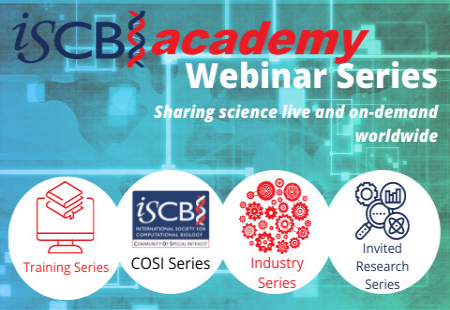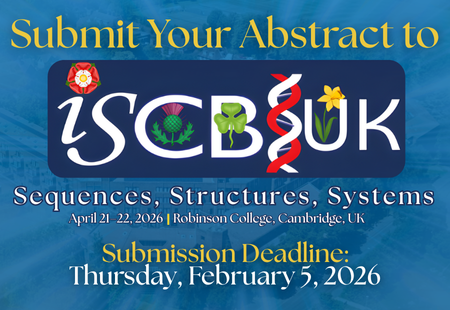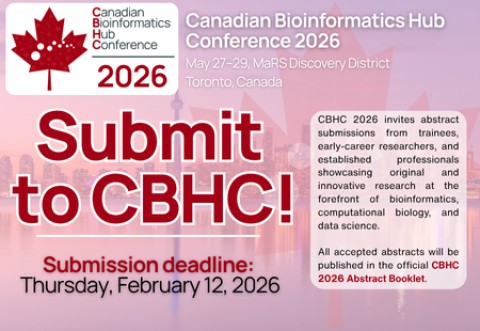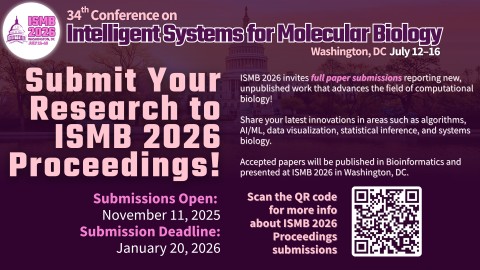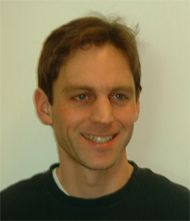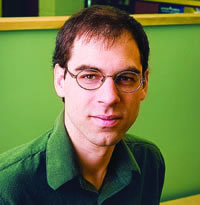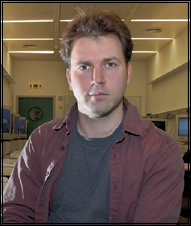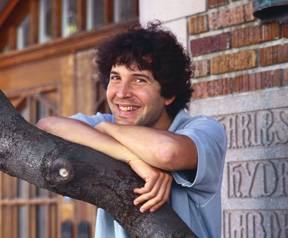|
|
|
Picture: 2003 Overton Prize Winner, Jim Kent
|
2003 Overton Prize Winner - Jim Kent
The ISCB will award the Overton Prize for 2003 to W. James Kent, an assistant research scientist at the University of California, Santa Cruz. The award, which recognizes outstanding achievement in the field of computational biology, will be presented at ISMB2003, where Kent will deliver the annual Overton Lecture on July 1, 2003.
Kent is best known as the researcher who "saved" the human genome project, a feat chronicled in the New York Times. With little more than a month before the company Celera was to present a complete draft of the human genome to the White House in 2000, Kent wrote GigAssembler, a program that produced the first full working draft assembly of the human genome, which kept the data freely available in the public domain.
Kent's main scientific goal has been to understand gene regulation by building bioinformatics tools such as his Intronerator system for exploring the genome of C. elegans; the program WABA, one of the first pair-HMMs for alignment of genomic DNA of two species; Improbiser, an expectation-maximization method to discover and cluster potential transcription factor binding sites; and the popular BLAT, which rapidly searches full genomes at both the DNA and protein levels.
>> Return to List of Overton Prize Recipients
 |
Picture: 2009 Overton Prize Winner,
Trey Ideker |
2009 Overton Prize: Trey Ideker
Trey Ideker initially trained in computer science. A friend who was a molecular biologist in graduate school gave him the names of potential advisors, one of who was Leroy Hood, co-founder of the Institute of Systems Biology (ISB) in Seattle, Washington. In 1996, and before the ISB was founded, Ideker moved to Seattle to join Hood as one of his first graduate students there. This move set the stage for a career that has already produced some groundbreaking work in the area of network biology.
Ideker's graduate studies coincided with the later years of the Human Genome Project. “When I joined the lab, everyone there was working on sequence analysis,” he remembers. “I was working with a talented physician and postdoc, Pete Nelson, who was studying the pathways in cells that led to the development of prostate cancer. I started trying to model these pathways; this project fell on its face, as it was far too complex for a single graduate student, but the ideas it generated have become the basis for my whole career.” Working closely with Hood, he—while still a student—was one of the first to publish an integrated computational model of a metabolic network; this paper, published in 2001, has already been cited more than 850 times.
With this very promising start, he initially moved to the prestigious Whitehead Institute for Biomedical Research in Cambridge, Massachusetts, before family drew him back to the West Coast. He is now settled at the University of California San Diego (UCSD) as an associate professor. “UCSD is a fantastic place to do science. I can't imagine being more productive anywhere else. The growth of biotechnology in the San Diego area in recent years has been overwhelming.”
While at the Whitehead Institute and in collaboration with others looking at similar problems, Ideker further developed a prototype network modelling program that he had worked on in Hood's lab into what is now the widely used online tool Cytoscape. Cytoscape is now freely available under an open source license, and this has attracted a far larger pool of both users and developers than would have been attracted to a commercial enterprise.
Ideker has been turning his attention to medical applications of network modeling. He has compared the complete map of protein–protein interactions for the malaria parasite Plasmodium falciparum, generated using the yeast-two-hybrid method, against other eukaryotic networks, and proposed unique features of its metabolism that might be targeted in designing drugs against this destructive disease. He has also showed that grouping proteins into pathways and taking the average of the levels of each protein in a single pathway can add 8%–9% to the accuracy of prognostic predictions in breast cancer. And he is about to take his involvement in medical applications to a new level, as, in mid-2009, he takes up the position of head of genetics at a new institute within the University of California San Diego School of Medicine. “I will be moving from the periphery into the center of genomics-based medical research,” he says. “My vision is to integrate network analysis into medicine and develop useful clinical tools.”
This article is excerpted from the April 2009 issue of PLoS Computational Biology. To link to the full journal article please visit www.ploscompbiol.org/article/info:doi/10.1371/journal.pcbi.1000375.
>> Return to List of Overton Prize Recipients
|
|
|
Picture: 2001 Overton Prize Winner, Christopher B. Burg
|
2001 Overton Prize Winner - Christopher B. Burge
The ISCB Awards Committee unanimously selected Christopher B. Burge, of the Department of Biology, Massachusetts Institute of Technology, as the inaugural recipient of the Overton Prize for his work on identifying and modeling genes in higher eukaryotic organisms. The theory and tools that he developed have advanced our understanding of the human genome and aided scientists throughout the biomedical sciences in their work.
Chris was selected in recognition of his path breaking research on gene modeling and development of algorithms for gene identification. His work has had an enormous impact on genome annotation,” stated David States, Director of Bioinformatics of the University of Michigan, and Chair of the ISCB Awards Committee.
In recognition of his being awarded this prize, Burge gave a keynote lecture at the Intelligent Systems for Molecular Biology conference in Copenhagen, Denmark, held July 21-25, 2001 in Tivoli Gardens - one of the world's oldest amusement parks, situated in the very heart of the city.
For an abstract of Burge’s lecture please see http://ismb01.cbs.dtu.dk/talks/session4.html#session47
>> Return to List of Overton Prize Recipients
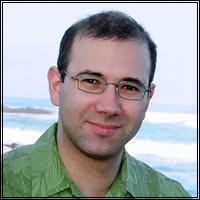
|
Picture: 2010 Overton Prize Winner,
Steven E. Brenner,
photo by Glen Dohie |
2010 Overton Prize: Steven E. Brenner
Each year ISCB honors a young scientist who has already achieved a significant and lasting impact on our field. The ISCB Awards Committee, comprised of current and former directors of the society and chaired by Søren Brunak, announced the recipient of the 2010 ISCB Overton Prize is Steven E. Brenner of the University of California, Berkeley, USA. Brenner will be presented with his award at ISMB 2010 in Boston, where he will give the opening keynote lecture on July 11th.
Brenner chose the flexibility of Biochemical Sciences for his undergraduate studies at Harvard, and followed his advisor’s encouragement to take computer science courses as well. As an undergraduate, he was able to work in Walter Gilbert’s lab, “maybe the very first genome lab in the world.” Gilbert and his colleagues were sequencing the genome of the bacterium Mycoplasma genitalium. While in Gilbert’s lab, Brenner met colleagues who introduced him to the idea of combining both his interests into the study of computational biology.
After graduation, Brenner obtained a fellowship for graduate study at the University of Cambridge, and studied for his PhD in the MRC Laboratory of Molecular Biology under Cyrus Chothia. As one of the original authors of the SCOP: Structural Classification of Proteins database, Brenner presented it at the second ISMB meeting in 1994. While initially having an uncertain reception, SCOP has since been cited over 4,000 times and remains widely used today.
After leaving Cambridge, Brenner obtained a fellowship to the National Institute of Bioscience, Japan, to work on genome analysis, but he was soon back in the US as a postdoctoral research fellow in Michael Levitt’s lab at Stanford University. In Levitt’s lab, he continued to work on genome and protein sequence analysis and the detection of distant evolutionary relationships between proteins.
In 2000, Brenner moved to the University of California, Berkeley, as an assistant professor, and became a faculty scientist at Lawrence Berkeley National Laboratory that same year. In 2009 he was appointed as an adjunct professor at the University of California, San Francisco, and is promoted to full professorship at UC Berkeley this year. His lab now includes experimental as well as computational biologists.
Over time, Brenner’s research interests have broadened away from protein structure. In the decade since obtaining his first independent position, he has contributed to the understanding of genomes, and to protein and RNA function. All of his work, however, can be characterized as using evolutionary principles and statistical and computational methods to understand biology. His most important contribution to the RNA field was the discovery of the prevalence of RNA surveillance and alternative splicing as a novel mode of gene regulation. He continues to work in this area and has extended his work in RNA regulation as a member of the modENCODE consortium, which aims to identify all the functional sequence elements in the Drosophila and Caenorhabditis elegans genomes. His recent research in protein function prediction picks up on scientific interests he first discovered as an undergraduate researcher at Harvard: his group’s prediction algorithms are amongst the most accurate available. He has also been involved in establishing computational approaches for the field of structural genomics, and has developed an interest in relating human genetic variation to phenotype and disease. He set out his “vision for personal genome interpretation” in a short paper in Nature in 2007, and for the last few years he has been advancing that vision for translational genomics.
Brunak recognizes that Brenner is at the upper end of the seniority bracket for the Overton Prize. “Young scientists who achieve a conspicuous success like SCOP very early in their career too often ‘burn out.’ In contrast, Brenner is a worthy winner because of the long-standing, excellent track record that he has established in research and scholarship,” he says. Brenner himself is quick to attribute much of this success to his “wonderful” mentors, collaborators, colleagues—and especially the postdocs and students in his group from whom he says he learned the most science. He cites inspirations ranging from his parents, to advisors Gilbert, Chothia, and Levitt, who taught him “how to do science at a high level,” to his senior colleague at Berkeley, Jasper Rine. This readiness to share the credit for his achievements further underscores his worthiness as the recipient of the 2010 ISCB Overton Prize.
This article is excerpted from the June 2010 issue of PLoS Computational Biology. To link to the full journal article please visit www.ploscompbiol.org/doi/pcbi.1000831.
>> Return to List of Overton Prize Recipients
|
|
|
Picture: 2006 Overton Prize Winner, Dr. Mathieu Blanchette
|
2006 Overton Prize Winner - Mathieu Blanchette
The International Society for Computational Biology (ISCB) awards the 2006 Overton Prize to Mathieu Blanchette, assistant professor in the School of Computer Science at McGill University in Montréal. The prize is awarded at the ISCB annual meeting, Intelligent Systems for Molecular Biology, held in Fortaleza, Brazil, on August 8, 2006 when Blanchette delivers the annual Overton keynote lecture entitled "What mammalian genomes tell us about our ancestors, and vice versa."
"Mathieu Blanchette is responsible for fundamental, highly cited contributions in several areas of bioinformatics," says Professor Thomas Lengauer of the Max-Planck-Institut für Informatik, who is chair of the ISCB Awards Committee.
"His doctoral thesis contained perhaps the first reasonable algorithm for gene-order phylogeny, based on a solution to the breakpoint median problem, and it also elaborated the now-famous concept of phylogenetic footprinting. As a postdoctoral researcher, he played a central role in working out algorithms for reconstructing ancestral mammalian genomes. His most recent work continues his interest in the inference of evolutionary scenarios and gene regulation. And he has been active in the bioinformatics community since his student days, presenting papers at the Computing and Combinatorics conferences and the Research in Computational Molecular Biology meetings, among others. He is currently organizing several workshops and conferences, has attracted many students to his new lab, and has been highly successful in obtaining funding in a competitive environment."
From 1994 through 1997, Blanchette was an undergraduate in the Mathematics and Computer Science departments of the Université de Montréal. After graduating, he did an M.Sc. there as well, writing a thesis on breakpoint phylogeny under the direction of David Sankoff. He then went to the University of Washington, obtaining a Ph.D. in Computer Science (2002) under the supervision of Martin Tompa. He spent the next year as a postdoctoral researcher at the Center for Biomolecular Science and Engineering of the University of California at Santa Cruz, where he worked with David Haussler. He took up his current position at McGill in 2003.
Blanchette says, "Chris Overton was one of the first explorers of the world of bioinformatics, before the name even existed, and he opened the area to young people like me. I am immensely grateful for the work he did and greatly honored to receive this award, created in his memory after his untimely death in 2000." The award is given annually to a scientist in the early to middle stage of his or her career who has contributed significantly to computational biology through research, education, service, or a combination of the three.
For an abstract of Blanchette's keynote address, please see
ismb2006.cbi.cnptia.embrapa.br/keynotes.html#blanchette.
>> Return to List of Overton Prize Recipients
|
|
|
Picture: 2005 Overton Prize Winner, Ewan Birney
|
2005 Overton Prize Winner - Ewan Birney
Dr. Ewan Birney of the EMBL European Bioinformatics Institute (EBI), was awarded the 2005 Overton Prize in honor of his advocacy of open source bioinformatics, and his generous contributions to the BioPerl community. Perhaps even more important to biology is his leadership of the Ensembl genome annotation project, providing rapid and accurate computational annotations for eukaryotic genomes.
"Dr. Birney follows his own advice, and credits the success of the Ensembl project to the open source development model," said Dr. Lawrence Hunter of the University of Colorado Health Sciences Center, the ISCB's founder and former chair of the ISCB Awards Committee. Hunter added, "Dr. Birney is not only a hugely productive scientist, but he started young: his first bioinformatics tools, Pairwise and Searchwise, were published when he was an undergraduate at Oxford, and their successor, GeneWise, is still in broad use more than a decade after its introduction."
The prize was awarded at the ISCB's annual meeting, Intelligent Systems for Molecular Biology (ISMB), in Detroit, Michigan, on June 29, where Dr. Birney then delivered the annual Overton keynote lecture on the final day of the conference.
For additional information on Dr. Birney’s many contributions to bioinformatics, please read the ISCB newsletter article at www.iscb.org/images/stories/newsletter/newsletter8-2/birney.html.
>> Return to List of Overton Prize Recipients
|
|
|
Picture: 2002 Overton Prize Winner, David Baker (photo credit: University of Washington/Mary Levin
|
2002 Overton Prize Winner - David Baker
The winner of this year’s Overton Prize, David Baker, associate professor at the University of Washington and Howard Hughes Medical Institute Investigator, delivered the Overton Lecture on the last day of ISMB2002. In the keynote talk, titled "Predication and design of protein structures and protein-protein interactions," Baker thanked the ISCB, "for this great honor." He then reviewed his research as well as explaining the contributions of his colleagues. Baker said, "It’s an exciting time because we can create new molecules that do all kinds of interesting things."
Larry Hunter, the founder of the ISCB and current Board member, introduced Baker. "David’s contributions to the field are many and excellent," he said. Hunter mentioned the CASP4 competition and said, "Thanks on behalf of the bioinformatics community for unraveling one of our most interesting problems."
The ISCB Awards Committee unanimously selected Baker to receive the Overton Prize for his work in applying computational science to drug design, genetics, and health care, and, in particular, the Rosetta algorithm, which predicts protein structure.
>> Return to List of Overton Prize Recipients
ISCB Nominations Form
The ISCB Fellows nomination form will open soon. Please check back within the next month if you wish to make a nomination.


